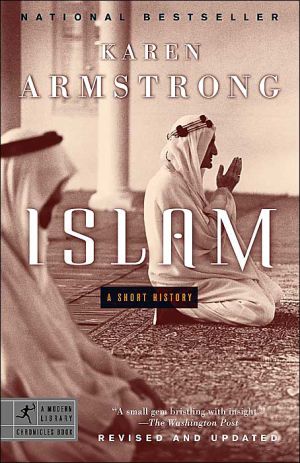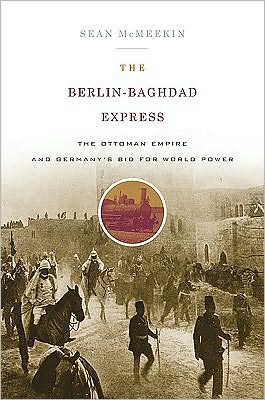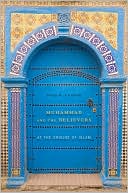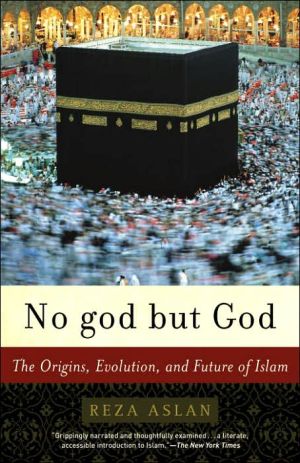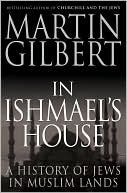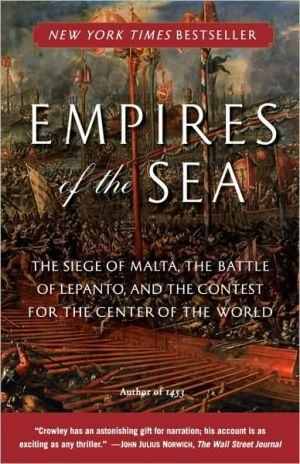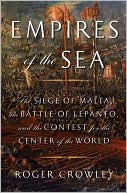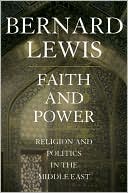Islam: A Short History
No religion in the modern world is as feared and misunderstood as Islam. It haunts the popular imagination as an extreme faith that promotes terrorism, authoritarian government, female oppression, and civil war. In a vital revision of this narrow view of Islam and a distillation of years of thinking and writing about the subject, Karen Armstrong’s short history demonstrates that the world’s fastest-growing faith is a much more complex phenomenon than its modern fundamentalist strain might...
Search in google:
Islam, A Short History is the concise summation of years of thinking and writing about the world's fastest growing religion, by Karen Armstrong, one of the foremost international scholars on religious affairs. Best-selling author of The Battle for God, Karen Armstrong writes about Islam with a deep understanding of the external history of the Muslim people, and the symbolic relationship between history and religion. Publishers Weekly Readers seeking a quick but thoughtful introduction to Islam will want to peruse Armstrong's latest offering. In her hallmark stylish and accessible prose, the author of A History of God takes readers from the sixth-century days of the Prophet Muhammad to the present. Armstrong writes about the revelations Muhammad received, and explains that the Qur'an earned its name (which means recitation) because most of Muhammad's followers were illiterate and learned his teachings not from reading them but hearing them proclaimed aloud. Throughout the book, Armstrong traces what she sees as Islam's emphasis on right living ( la Judaism) over right belief ( la Christianity). Armstrong is at her most passionate when discussing Islam in the modern world. She explains antagonisms between Iraqi Muslims and Syrian Muslims, and discusses the devastating consequences of modernization on the Islamic world. Unlike Europe, which modernized gradually over centuries, the Islamic world had modernity thrust upon it in an exploitative manner. The Islamic countries, Armstrong argues, have been "reduced to a dependent bloc by the European powers." Armstrong also rehearses some basics about Islamic fundamentalism in a section that will be familiar to anyone who has read her recent study, The Battle for God. A useful time line and a guide to the "Key Figures in the History of Islam" complete this strong, brisk survey of 1,500 years of Islamic history. (Aug.) Copyright 2000 Cahners Business Information.
PREFACE\ The external history of a religious tradition often seems divorced from the raison detre of faith. The spiritual quest is an interior journey; it is a psychic rather than a political drama. It is preoccupied with liturgy, doctrine, contemplative disciplines and an exploration of the heart, not with the clash of current events. Religions certainly have a life outside the soul. Their leaders have to contend with the state and affairs of the world, and often relish doing so. They fight with members of other faiths, who seem to challenge their claim to a monopoly of absolute truth; they also persecute their co-religionists for interpreting a tradition differently or for holding heterodox beliefs. Very often priests, rabbis, imams and shamans are Just as consumed by worldly ambition as regular politicians. But all this is generally seen as an abuse of a sacred ideal. These power struggles are not what religion is really about, but an unworthy distraction from the life of the spirit, which is conducted far from the madding crowd, unseen, silent and unobtrusive. Indeed, in many faiths, monks and mystics lock themselves away from the world, since the clamour and strife of history is regarded as incompatible with a truly religious life.\ In the Hindu tradition, history is dismissed as evanescent, unimportant and insubstantial. The philosophers of ancient Greece were concerned with the eternal laws underlying the flux of external events, which could be of no real interest to a serious thinker. In the gospels, Jesus often went out of his way to explain to his followers that his Kingdom was not of this world, but could only be found within the believer. The Kingdom would not arrive with a great political fanfare, but would develop as quietly and imperceptibly as a germinating mustardseed. In the modern West, we have made a point of separating religion from politics; this secularization was originally seen by the philosophes of the Enlightenment as a means of liberating religion from the corruption of state affairs, and allowing it to become more truly itself.\ But however spiritual their aspirations, religious people have to seek God or the sacred in this world. They often feel that they have a duty to bring their ideals to bear upon society. Even if they lock themselves away, they are inescapably men and women of their time and are affected by what goes on outside the monastery, although they do not fully realize this. Wars, plagues, famines, economic recession and the internal politics of their nation will intrude upon their cloistered existence and qualify their religious vision. Indeed, the tragedies of history often goad people into the spiritual quest, in order to find some ultimate meaning in what often seems to be a succession of random, arbitrary and dispiriting incidents. There is a symbiotic relationship between history and religion, therefore. It is, as the Buddha remarked, our perception that existence is awry that forces us to find an alternative which will prevent us from falling into despair.\ Perhaps the central paradox of the religious life is that it seeks transcendence, a dimension of existence that goes beyond our mundane lives, but that human beings can only experience this transcendent reality in earthly, physical phenomena. People have sensed the divine in rocks, mountains, temple buildings, law codes, written texts, or in other men and women. We never experience transcendence directly: our ecstasy is always "earthed," enshrined in something or someone here below. Religious people are trained to look beneath the unpromising surface to find the sacred within it. They have to use their creative imaginations. Jean-Paul Sartre defined the imagination as the ability to think of what is not present. Human beings are religious creatures because they are imaginative; they are so constituted that they are compelled to search for hidden meaning and to achieve an ecstasy that makes them feel fully alive. Each tradition encourages the faithful to focus their attention on an earthly symbol that is peculiarly its own, and to teach themselves to see the divine in it.\ In Islam, Muslims have looked for God in history. Their sacred scripture, the Koran, gave them a historical mission. Their chief duty was to create a just community in which all members, even the most weak and vulnerable, were treated with absolute respect. The experience of building such a society and living in it would give them intimations of the divine, because they would be living in accordance with God's will. A Muslim had to redeem history, and that meant that state affairs were not a distraction from spirituality but the stuff of religion itself The political wellbeing of the Muslim community was a matter of supreme importance. Like any religious ideal, it was almost impossibly difficult to implement in the flawed and tragic conditions of history, but after each failure Muslims had to get up and begin again.\ Muslims developed their own rituals, mysticism, philosophy, doctrines, sacred texts, laws and shrines like everybody else. But all these religious pursuits sprang directly from the Muslims' frequently anguished contemplation of the political current affairs of Islamic society. If state institutions did not measure up to the Quranic ideal, if their political leaders were cruel or exploitative, or if their community was humiliated by apparently irreligious enemies, a Muslim could feel that his or her faith in life's ultimate purpose and value was in jeopardy. Every effort had to be expended to put Islamic history back on track, or the whole religious enterprise would fall, and life would be drained of meaning. Politics was, therefore, what Christians would call a sacrament: it was the arena in which Muslims experienced God and which enabled the divine to function effectively in the world. Consequently, the historical trials and tribulations of the Muslim community— political assassinations, civil wars, invasions, and the rise and fall of the ruling dynasties-were not divorced from the interior religious quest, but were of the essence of the Islamic vision. A Muslim would meditate upon the current events of their time and upon past history as a Christian would contemplate an icon, using the creative imagination to discover the hidden divine kernel. An account of the external history of the Muslim people cannot, therefore be of mere secondary interest, since one of the chief characteristics of Islam has been its sacralization of history.
List of MapsPrefaceChronology1BeginningsThe Prophet (570-632)3The Rashidun (632-661)23The First Fitnah332DevelopmentThe Umayyads and the Second Fitnah41The Religious Movement45The Last Years of the Umayyads (705-750)50The Abbasids: The High Caliphal Period (750-935)53The Esoteric Movements653CulminationA New Order (935-1258)81The Crusades93Expansion95The Mongols (1220-1500)964Islam TriumphantImperial Islam (1500-1700)115The Safavid Empire117The Moghul Empire124The Ottoman Empire1305Islam AgonistesThe Arrival of the West (1750-2000)141What is a Modern Muslim State?156Fundamentalism164Muslims in a Minority176The Way Forward178Epilogue189Key Figures in the History of Islam193Glossary of Arabic Terms203Pronunciation Guide207Notes209Suggestions for Further Reading211Index219Discussion Questions229
\ From Barnes & NobleIslam is the world's fastest-growing religion -- and the most feared. Although, as Edward Gibbon noted, "The greatest success of Mohammed's life was effected by sheer moral force without the stroke of a sword," Westerners continue to fear the onslaught of legions of fanatical Muslims. Karen Armstrong, perhaps the most eloquent of religious historians, approaches this history of a world faith with the same blend of tolerance and exactitude that made her A History of God such an ecumenical visitation.\ \ \ \ \ Publishers Weekly - Publisher's Weekly\ Readers seeking a quick but thoughtful introduction to Islam will want to peruse Armstrong's latest offering. In her hallmark stylish and accessible prose, the author of A History of God takes readers from the sixth-century days of the Prophet Muhammad to the present. Armstrong writes about the revelations Muhammad received, and explains that the Qur'an earned its name (which means recitation) because most of Muhammad's followers were illiterate and learned his teachings not from reading them but hearing them proclaimed aloud. Throughout the book, Armstrong traces what she sees as Islam's emphasis on right living ( la Judaism) over right belief ( la Christianity). Armstrong is at her most passionate when discussing Islam in the modern world. She explains antagonisms between Iraqi Muslims and Syrian Muslims, and discusses the devastating consequences of modernization on the Islamic world. Unlike Europe, which modernized gradually over centuries, the Islamic world had modernity thrust upon it in an exploitative manner. The Islamic countries, Armstrong argues, have been "reduced to a dependent bloc by the European powers." Armstrong also rehearses some basics about Islamic fundamentalism in a section that will be familiar to anyone who has read her recent study, The Battle for God. A useful time line and a guide to the "Key Figures in the History of Islam" complete this strong, brisk survey of 1,500 years of Islamic history. (Aug.) Copyright 2000 Cahners Business Information.\ \ \ Library JournalWithin the Muslim world, history and politics are inseparable vehicles of religious expression and cultural identity. A proper understanding of Islamic history is therefore essential if we are ever to resolve the major issues we face in the Middle East. In her newest book, best-selling author Armstrong (Muhammad: A Biography of the Prophet; Jerusalem: One City, Three Faiths) does an admirable job of presenting Islamic history from an objective, unbiased point of view. This book (part of a new series of small-format hardcover originals from Modern Library) is a distillation of years of writing and thinking about Islam. The history of conflicts with the West from 1750 to the present, the modern Muslim State, fundamentalism, and the Muslim minority are some of the themes addressed. A listing of key figures in Islam is included. Short but detailed, this excellent synopsis of the topic is recommended for all libraries. [Previewed in Prepub Alert, LJ 4/1/00.]--Michael W. Ellis, Ellenville P.L., NY Copyright 2000 Cahners Business Information.\\\ \ \ \ \ William H. McNeillA valuable corrective to the hostile caricatures of Islam that circulate in the English-speaking world . .. engaging, provocative and often persuasive.\ —The New York Times Book Review\ \ \ \ \ Kirkus ReviewsWould-be students of Islam will throw up their hands in despair at this tangled account of 14 centuries of battling Muslims.\ \
